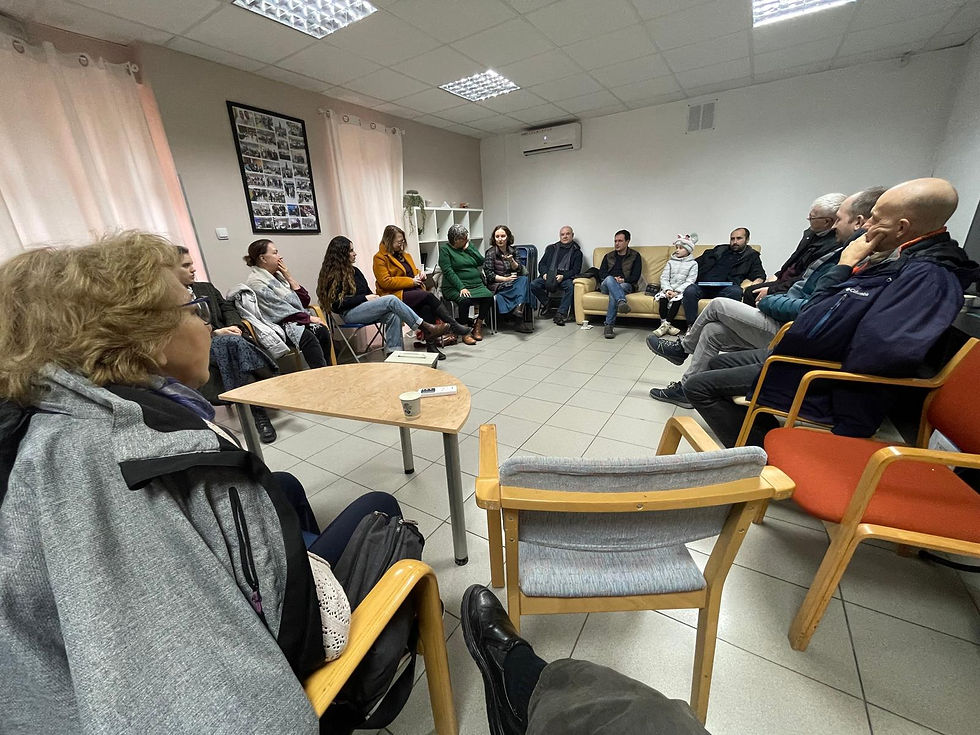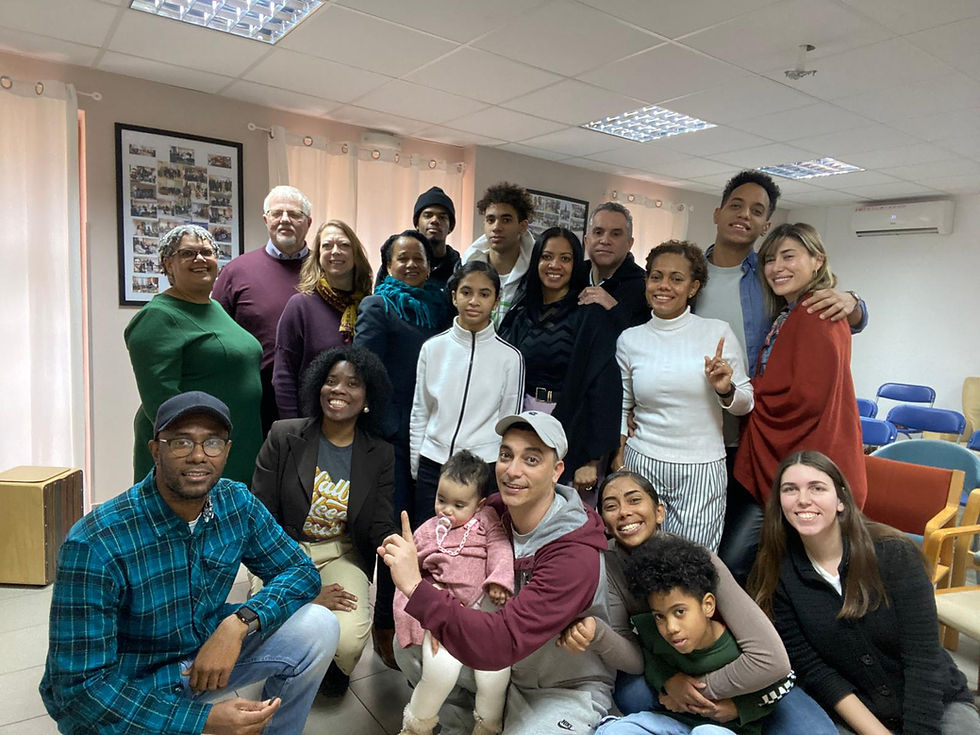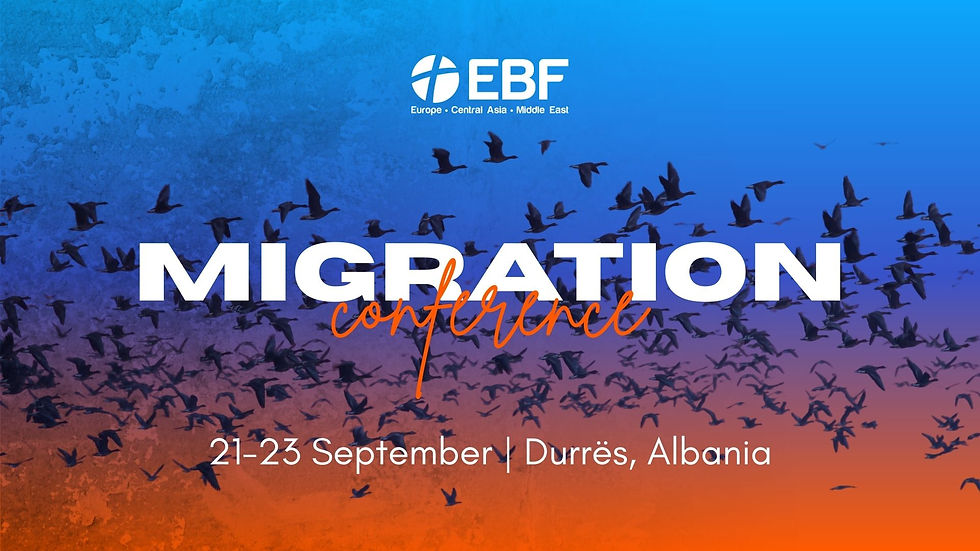Migration Commission Reflections
- EBF Communications

- Sep 4, 2025
- 4 min read
From Nyúl Zoltán, Serbia:
When we welcomed the first Russian family, we experienced again a similar situation we had in the 1990s. It's very difficult for people who have to leave their country. They were a big family; only the younger children and the mother could come, the adult sons and the father could not come. The first scares, confusion and language barriers were solved by our common faith. They recognized some of the songs in the church and sang with us. They clung stubbornly to their own ways, but they also wanted to learn the new. It was an interesting experience for all of us: the community supported them, helped them with basic things.

Then came new people and new people. Europe is experiencing the biggest exodus of our time: Ukrainians and Russian speakers fleeing to uproot their lives and start a new one, which will be an everlasting possible choice, here and there - their lives changed forever. In this crisis, we want to help families and individuals connected to the churches: with what we can, with spiritual nourishment, support, legal advice in the new environment, friendship, covering and replacing everyday needs. Our meeting in Belgrade with Russian, Russian-speaking believers was good - we have trust in Christ, and we can be strengthened by each other's faith.
From Joy El Kazzi, Beirut:
Belgrade, Serbia, was a trip I will always remember.
I stepped into the church and was met with overwhelming hospitality. It felt like I was in Lebanon. People were smiling, inviting me to lunch, saving me a place to sit, and offering me more food than I ever needed.
Sitting at the table, we were joined by a group of Russians. It might be because I was from the other side of the planet, or because my brain had compiled a stereotype that I was not aware of, but I asked an unassuming question to my colleague and said to her, “Why are there so many Russians in Serbia?” And she answered me with the simplest response, “Well, they are refugees.”
That is when it hit me. It was like my brain was so accustomed to seeing refugees from the Middle East that I almost believed that challenges and issues only happen on our side of the Earth. It also might be because we grew up with the mentality that the West is the land where dreams come true. It was hard for me to grasp that even though the Russians come from a first-world country that is far more developed than Lebanon or anywhere in the Middle East, we can still have shared experiences and challenges.
It is unfortunate, though, that this is what we bonded over: Shared trauma.

When we sat together, I heard the story of a mother who was struggling to make ends meet all alone with her daughter and a father who was forced to stop working due to health issues, which required the wife to do all the financial heavy-lifting. I was quickly reminded of stories from Syrian and Palestinian refugees back home. Even though the differences between them were stark, the similarities were undeniable. How could it be that nations that are extremely different, oceans away, share the same hardships?
This experience truly opened my eyes to one reality: Vulnerability is situational. We are all innately weak and depend on external forces and circumstances to survive. These circumstances, however, can fade away in a split second. Vulnerability is a core trait of humanity. And while we as humanitarians stress on not creating dependency, it begs the question: aren’t we all dependent on something or someone? And what happens when what we depend on fades away?
This is a lesson that I will forever remember, because it brought me closer to seeing people the way Jesus sees all of us as equals and helps all those who call on Him. It is my prayer that we depend solely on His providence and look to Him as the only true source of hope, satisfaction, and solace.
From Juliet Kilpin, Chair of the Commission on Migration:
I am in a basement meeting room of a church. From the back row, I see 12 people gently swaying rhythmically from side to side. One man rocks his baby, who is blissfully asleep. ‘Espíritu Santo’ is sung repeatedly by everyone, accompanied by the exuberant sounds of guitar and drum box and the charismatic, passionate prayers of the woman leading from the front.
Aleluya.
Gracias Jesus.
Nosotras te adoramos.
But I am not in Spain. And these people are not Spanish. I am in Serbia. And the people I am with are Cuban refugees.
A young man fled Cuba because he didn’t want to be conscripted to fight in the army. A father fled because he didn’t want his teenage son to be conscripted or kidnapped. With limited opportunities to work or build a life in Cuba, they took a chance to enter Serbia, as there are no visa entry requirements, and further work visas or asylum claims can be considered.
In search of Christian community, Julio, the pastor, tells me how they began meeting in the open air of a park in Belgrade, using social media to let other Cubans know they could join.
For the first year, this small group met in the park during the summer and the winter. Then, Baptist pastor Dane got to know them and invited them to use the basement of the church. On this one Sunday in this one church building, I have met with the Serbian congregation, had lunch with Russian-speaking Christians displaced to Belgrade and worshipped with Cubans.
Those from Cuba also feel the call to mission in Serbia. They have planted a church and are also looking to serve the needs of Serbs. They hope to open a coffee shop and use their barista skills to create a missional space for spiritual conversations. Pray for them as they build new lives and serve others with love.




Comments